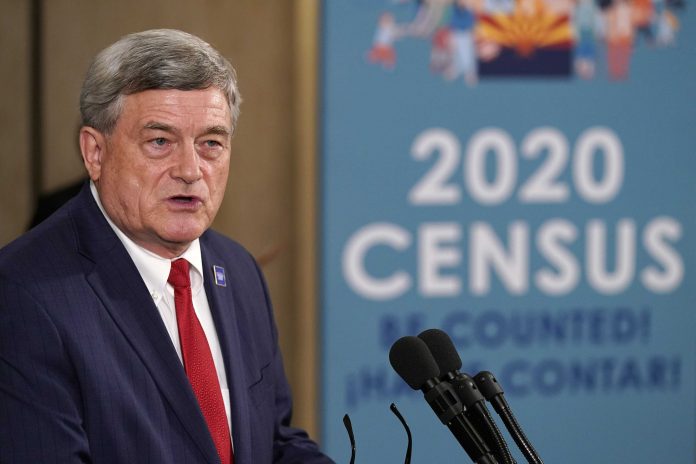With the number of U.S. households counted topping 95%, there is no reason for a judge to order the U.S. Census Bureau to extend by a month the head count of every U.S. resident, government attorneys said in court papers Tuesday.
“Plaintiffs’ claims of harm in this matter are rapidly evaporating,” the government attorneys said ahead of a virtual court hearing in San Jose, California, over whether the 2020 census should stop Sept. 30 or continue through Oct. 31.
A coalition of cities, counties and civil rights groups is suing the Census Bureau and the Department of Commerce in an effort to extend the 2020 census for another month. They said in court papers Tuesday that the decision to shorten the schedule was forced on the bureau. Bureau officials knew the shortened scheduled would risk accuracy in the count and “was impossible to do right.”
In an internal email sent to other top Census Bureau officials in late July, Tim Olson, associate director for field operations, said the bureau was having trouble deploying census takers because “people are afraid to work for us.”
“And this means it is ludicrous to think we can complete 100% of the nation’s data collection earlier than 10/31 …” Olson said in the email that was released into the court record Tuesday.
“Anyone who thinks that the Census Bureau can turn in numbers used for figuring out how many congressional seats each state gets by the end of the year “has either a mental deficiency or a political motivation,” Olson said.
The judge in the San Jose case earlier this month issued a temporary restraining order prohibiting the Census Bureau from winding down 2020 census operations until she could issue a ruling. Plaintiffs in the San Jose case allege the decision to shorten the schedule was made to accommodate a directive from President Donald Trump. The order tried to exclude people in the country illegally from being included in the numbers used for deciding how many congressional seats each state gets in a process known as apportionment.
A three-judge panel in New York blocked Trump’s directive earlier this month, saying it was unlawful. The Trump administration ion Tuesday asked the Supreme Court for fast action on its appeal.
Before the coronavirus pandemic hit in March, the bureau had planned to complete the 2020 census by the end of July. In response to the pandemic, it extended the deadline to the end of October. That changed to the end of September after the Republican-controlled Senate failed to take up a request from the Census Bureau to extend the deadline for turning over the numbers used for apportionment. As a result, government attorneys say the Census Bureau has no choice but to finish the count by Sept. 30.
The census helps determine how $1.5 trillion in federal spending is distributed annually and how many congressional seats each state gets.
In their court papers Tuesday, the government attorneys, supported by a declaration from a Census Bureau associate director, said the census operations were being harmed by the temporary restraining order. The order prevented operations from winding down in areas almost completely counted so the most successful census takers can focus on the hardest cases. they said.
The government attorneys said they were inclined to appeal the temporary restraining order on Wednesday, and if that appeal isn’t allowed by the judge, the Census Bureau would be forced to take steps toward winding down operations which they had halted been because of the order.
If U.S. District Judge Lucy Koh agrees with the plaintiffs to issue an order mandating the extra month for the census, it should be suspended while the Census Bureau appeals, the government attorneys said.
In his declaration, Al Fontenot, an associate director for Decennial Census Programs, said that while West Coast wildfires and Gulf Coast hurricanes threatened the completion of the census, so did the judge’s temporary order.
“Every day that Court injunctions preclude us from following our normal field procedures makes it more difficult for us to complete a timely and complete census,” Fontenot said.




















